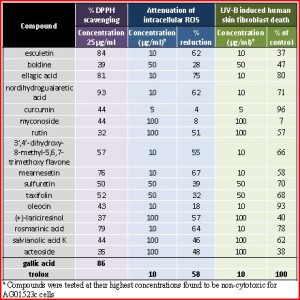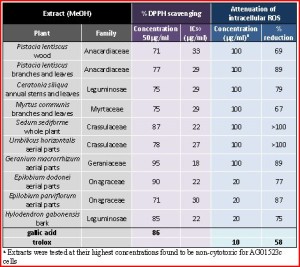Skin is a major target of oxidative damages due to the constant exposure to exogenous factors, such as UV-irradiation. Free radicals and reactive oxygen species (ROS) are involved in the mechanism leading to cutaneous damages, such as early ageing, inflammatory disorders and skin cancers (1). Many skin protective formulations contain antioxidants, which can interrupt the radical-chain processes, help the skin to repair systems, improve cell rejuvenation and prevent skin-cancer (2). The aim of our project is to discover and carry to the stage of development candidates, plant derived small molecules with potential as new cosmetic agents with antioxidant and UV-protective properties. The structure of our work was initially to evaluate the antioxidant and UV-protective effects of natural products belonging to different categories. Based on this screening results, Greek flora is analyzed for species/genera/families and a plant inventory of 450 species expected to afford desired active candidates is established. Methanolic and ethyl acetate extracts of selected plants are evaluated for these properties.
The antioxidant activity of 480 compounds and 900 extracts was assessed in a cell-free system by measuring the decrease of free radical DPPH detected at 517 nm after 30 min of incubation. Compounds and extracts with high antioxidant activity in DPPH assay were evaluated for their capacity to reduce the intracellular reactive oxygen species (ROS), i.e. to act as antioxidants in the cellular context as well. Samples were applied overnight to human skin fibroblast cultures at the highest non-cytotoxic concentrations (as assessed by MTT assay), and DCFH-DA fluorescence was measured at 520 nm after excitation at 480 nm (Tables 1 and 2).
Analysis of biological screening data for 480 natural products revealed 16 phenolic compounds, such as flavonoids, lignans, phenolic acids and phenylpropanoid glycosides with high antioxidant activity against preliminary DPPH assay. In continuation, antioxidant activity was assessed in the cellular context against reactive oxygen species (ROS). Esculetin, ellagic acid, rosmarinic acid, mearnesetin and nordihydroguaiaretic acid were found to posses strong antioxidant activity in both assays tested, while esculetin, (+)-lariciresinol, acteoside and myconoside exhibited strong protective properties against UV-induced cell death. Ten methanolic extracts exhibited strong antioxidant activity in the DPPH assay. Among them, Pistacia lentiscusand Myrtus communis also exerted an efficient intracellular antioxidant activity. A systemic microfractionation process will be performed in most promising extracts leading to potential cosmetic agents derived from these plants.
1.Vertuani S. et al. Skin Research an Technology (2003), 9, 245-253
2.Lee M-R et al. Journal of Chromatography A (2006), 1120, 244–225
Poster presentation in International Congress on Natural Products Research, Jul 28 – Aug 1, 2012, New York, USA




